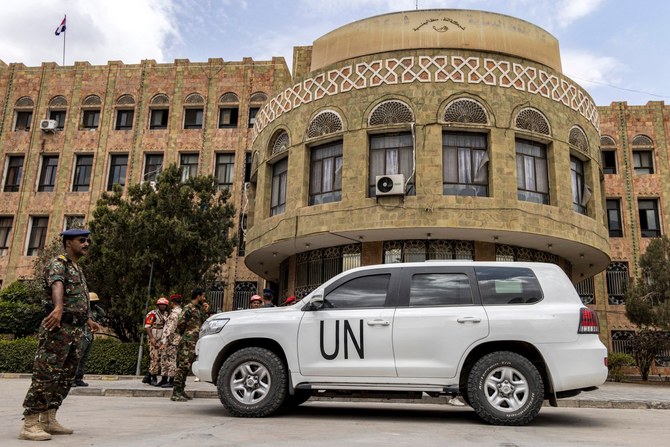London: Houthi authorities in Yemen must release dozens of people arrested and forcibly disappeared since May, Human Rights Watch said on Wednesday.
In a report, HRW said the Houthis have forcibly disappeared Yemenis in territory they control, including at least 13 UN staff, as part of a wider crackdown on civil society.
“The arbitrary arrests appear to be based on the detainees’ present or past employment,” HRW added.
Beginning May 31, Houthi forces began arresting employees of several NGOs, raiding homes and offices. One source said more than 60 people had been arrested as of June 12.
In all cases, Houthi forces “arrived unannounced at the homes of those they were aiming to arrest with several armored vehicles and an average of about 10 to 30 armed men,” HRW said.
“Almost all forces were wearing military uniforms and head and face coverings, sometimes with only their eyes showing. In many cases, the forces arrived early in the morning while families were still asleep.”
No search or arrest warrants were presented in any of the cases, and Houthi forces have denied requests from family members asking for the whereabouts of their kin. No formal charges have been brought against any of the detainees.
However, starting June 10, Houthi authorities began releasing a series of videos showing Yemeni men detained between 2021 and 2023 confessing to spying for Israel and the US.
HRW said there is a “high risk” that the confessions were coerced, and sources told the NGO that the timing of the releases was intended to “frame” the recently detained as part of a larger “spy network.”
UN Secretary-General Antonio Guterres and UN High Commissioner for Human Rights Volker Turk have called on the Houthis to release all UN and NGO staff.
Since the start of the raids in late May, many people in Houthi-controlled areas of Yemen have fled.
The existing “brain drain” from Houthi-controlled areas will only worsen as a result of the arrest campaign, one source told HRW.
Another said: “Although I managed to flee … I couldn’t sleep … I’ve had panic attacks every day since I fled from Sanaa … I’m very worried about my friends and colleagues in Sanaa who are just waiting for Houthis to arrest them.”
Since 2014, the Houthis have detained and forcibly disappeared hundreds of people, HRW said, warning that the militia regularly practices torture in detention facilities.
The Houthis have also “carried out significant violations of women’s rights and freedoms, have repressed freedom of speech and assembly, and have detained dozens of journalists, human rights defenders, academics, and political opponents,” the NGO added
Niku Jafarnia, Yemen and Bahrain researcher at HRW, said: “The Houthis are using arbitrary detentions and enforced disappearances as a political tool at a time when the people living in their territories lack even the most basic needs.
“The Houthis should immediately release all of these people, many of whom have spent their careers working to improve their country.
“The international community should be doing everything in their power to ensure that these people are immediately released.
“Many of them have been invaluable members of Yemeni civil society organizations and staff in UN agencies and nongovernmental international groups.”
One Yemeni living abroad told HRW: “It’s almost as if our life in Yemen is over after this. I thought I would move back and start a family there, and now it’s clear to me I can’t do that. We can’t live like this.”


























